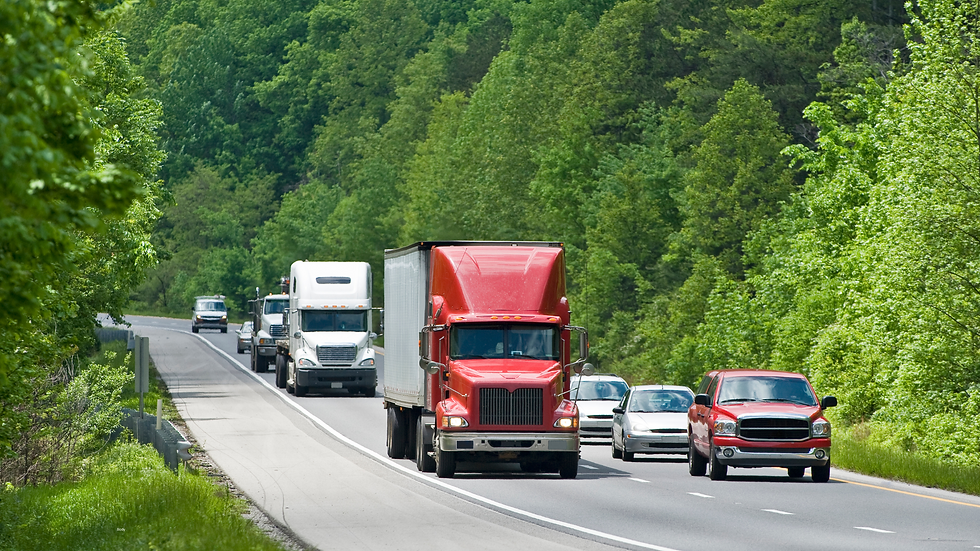UNDERSTANDING THE DIFFERENT TYPES OF TRUCKING INSURANCE
- Aug 27, 2025
- 3 min read

The trucking industry runs on tight schedules, long miles, and constant motion. Every shipment carries not just cargo, but risk, a risk that can impact your livelihood if left unprotected. Behind every journey lies a carefully orchestrated operation, balancing efficiency, deadlines, and risk. Whether you are a fleet manager, independent operator, or someone new to the road, one thing remains constant: the need for protection. Trucks are not just vehicles. They are investments, lifelines, and livelihoods. And like any asset, they deserve smart protection.
Trucking insurance exists not as an afterthought, but as a structural support system, keeping your operations running when the unexpected occurs. Accidents, cargo theft, breakdowns, and ever-evolving regulations all pose real threats. The right coverage transforms risk into resilience.
For a broader overview of what insurance your trucking business may need, read What Insurance Do I Need for My Trucking Company? Everything You Need to Know.
What Is Trucking Insurance?
Trucking insurance is a suite of commercial policies designed to protect trucks, drivers, and the freight they haul. It goes far beyond the personal auto insurance one might carry on a family car. Where personal policies stop, trucking insurance begins, designed for the scale, complexity, and liability of commercial operations.
State and federal laws mandate certain coverages. For example, the Federal Motor Carrier Safety Administration (FMCSA) requires liability insurance for interstate trucking. Compliance isn’t optional. It’s foundational.
Primary Types of Trucking Insurance
Primary Liability Insurance
This is the cornerstone. It covers bodily injury and property damage to others when your truck is at fault in an accident. Legally required for all commercial trucks, this policy helps you meet basic regulatory obligations and avoid catastrophic financial exposure.
Physical Damage Coverage
This protects the truck itself. It’s typically broken down into:
Collision Coverage: For accidents involving another vehicle or object.
Comprehensive Coverage: For fire, theft, vandalism, or weather-related damage.
Learn more about how this policy works in Do You Need Physical Damage Coverage?.
Cargo Insurance
Cargo doesn’t transport itself. And when something goes wrong, such as spoilage, theft, or accidents, this policy steps in. Many clients and contracts require cargo coverage. FMCSA mandates it in certain cases. A missing pallet should not derail your entire month.
Zinc breaks it down further in Do You Need Motor Truck Cargo Insurance?.
Non-Trucking Liability (Bobtail Insurance)
When your truck is on the road but not under dispatch, perhaps returning from a job or heading home, this policy offers coverage. It fills a gap that can otherwise leave owner-operators vulnerable.
More on this in Do You Need Bobtail and Deadhead Coverage?.
General Liability Insurance
Think beyond the road. Accidents can happen at a warehouse, on a loading dock, or even at a client’s facility. This insurance covers those third-party injuries and property damage incidents unrelated to driving.
We explore this in detail in Do You Need General Liability Coverage?.
Specialized Coverages for Truckers
Trucking isn’t one-size-fits-all. Neither is insurance. Depending on your operations, you may need:
Motor Truck Cargo Insurance Extensions: Extra protection for high-value or hazardous freight.
Trailer Interchange Insurance: If you haul trailers you don’t own, this ensures coverage in case of damage.
Workers' Compensation: Required if you employ other drivers. It protects your team and limits your liability.
Uninsured/Underinsured Motorist Coverage: Because not every driver out there plays by the rules.
How to Choose the Right Coverage
Like any sound design, choosing insurance begins with analysis:
Assess your operations: What are you hauling? Where do you operate? How many vehicles are in your fleet?
Understand legal obligations: Different states and freight types carry different requirements.
Compare policies: Look at limits, deductibles, and exclusions. One policy’s bargain could be another’s blind spot.
Consult a specialist: Work with advisors who understand trucking insurance. It’s a niche field. Generalists won’t cut it.
If you're unsure how to compare options, see How to Compare Truck Insurance Quotes: 8 Terms to Look For.
How Zinc Insurance Supports Truck Drivers
At Zinc, we understand that trucking isn’t just a job. It’s a backbone industry. Our team builds insurance packages tailored to your specific risks, with no filler and no shortcuts.
Why truckers choose Zinc:
Competitive rates without compromise.
Customizable coverage that fits your routes and freight types.
A team fluent in FMCSA compliance and real-world logistics.
24/7 claims support that moves at the pace of your business.
We don’t just offer policies. We offer peace of mind at 70 mph.
Protect Your Business and Your Future
In trucking, preparation beats luck every time. The right insurance isn’t a luxury; it’s a necessity. It keeps your assets protected, your business compliant, and your mind clear.
Take a moment to evaluate your coverage. Gaps can be expensive. Zinc can help you close them with confidence.




